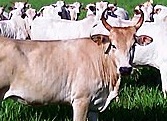 The food we eat and how we produce it are key to determining what kind of future we and our children will have. In the new report Less is more, Greenpeace answer the question of “what to eat?” by reviewing the scientific evidence exposing what our health and the health of the planet demand from us: a global reduction of 50% in production and consumption of animal products by 2050 and a change in the way we produce them.
The food we eat and how we produce it are key to determining what kind of future we and our children will have. In the new report Less is more, Greenpeace answer the question of “what to eat?” by reviewing the scientific evidence exposing what our health and the health of the planet demand from us: a global reduction of 50% in production and consumption of animal products by 2050 and a change in the way we produce them. Our food system — including changes in land use linked to agriculture — is currently responsible for a quarter of all greenhouse gas emissions that cause climate change. Meat and dairy production alone already releases as much greenhouse gas emissions as the transport sector. If we do nothing, by 2050 gas emissions from the food system will represent over half of the total global emissions associated with human activities.
The effect of meat and dairy production on biodiversity is also staggering. Since 1970, the Earth has lost half of its wildlife but tripled its livestock population. Intensive meat and dairy production is a major driver of deforestation, dead zones in the oceans, and degradation of freshwater bodies globally.
Perhaps most insidious is this: increasing meat and dairy production and consumption is behind a latent global health crisis. High red meat consumption has been linked to cancer, heart disease, obesity, and diabetes. Industrial animal agriculture is also associated with antimicrobial resistance — which the World Health Organization declared a “global health emergency” — and is a significant source of foodborne pathogens. Millions of lives could be saved each year if people had better access to a diet rich in plant-based foods.


